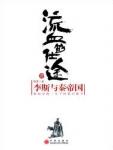Chapter 1 foreword
It's very simple, I'm going to write about a few officials in ancient times, and ponder their skills in mixing up their official careers.
Let’s start with classmate Li Si.
In Xianyang City, the yellow dog is sighing, how can it be like a golden scorpion pouring under the moon?
Li Si and the Qin Empire
Preface: Evidence of history with the heart, as if experiencing it personally
It was in early 2006 that I started writing "Bleeding Official Career: Li Si and the Qin Empire".
At that time, the idea was very simple. I just wanted to write a novella around the life of Li Si, the prime minister of the Qin Empire, for the readers.When the first few parts of the article were serialized in Tianya's "History of Cooking Wine", the enthusiasm of the readers far exceeded my expectations, and they gave me a lot of praise that I didn't deserve.Of course, it is precisely because of their existence that the more I write, the more I can't control it, and until today, I have completed this book.
Li Si was born at the bottom of the society. When he was young, he was just a small official in Chu State who guarded the granary.Sensitive to the value of life and anxious about individual existence, he walked out of the small town of Shangcai without hesitation, and came to Xianyang, the capital of the Qin State, and began to take risks for his dreams and fight for his destiny. As the prime minister under one person and above ten thousand people in the Qin Empire, he has influenced the political structure of China for more than two thousand years in the future.Among them, what kind of struggle did Li Si go through, and how did he achieve his extraordinary life?
In the history books, there are many unsatisfied answers to these two questions.This book tries to adopt the law of mirror image, standing in the perspective of Li Si, taking official history records as the benchmark, supplementing with reasonable imagination and conjecture where the official history is not available, continuing the blank, running through the front and back, and restoring Li Si's life in detail, so as to make it Full and complete.
Li Si's life lasted from the end of the Warring States Period to the Qin Empire.This era, from the Spring and Autumn Period to the Han and Tang Dynasties, is a key turning point in Chinese history.And to travel through this glorious era, there is no more suitable tour guide than Li Si.Important figures at that time, such as Ying Zheng, Lu Buwei, Han Fei, Meng Tian, Zhao Gao, etc., either entangled with Li Si's interests, or had endless grievances with Li Si; Li Si either personally experienced or personally contributed to power, admonishing and expelling guests, unifying wars, abolishing feudalism, burning books, burying Confucianism, establishing the second emperor, etc.It can be said that knowing Li Si also understood that legendary era to a considerable extent.
The writing method of this book is different from the usual historical novels.I have no intention of reducing history to a list of mottled past events.The ancients are far away, but they once experienced stress, anger, despair, joy, happiness, and ecstasy just like us today.Not only Li Si, but also Ying Zheng, Lu Buwei, Han Fei, Meng Tian and others, it was because of their fiery beating hearts that they jumped out of that glorious and great era.The goal of my writing is to imitate their thoughts, revisit their hearts, and let readers "evidence history with their hearts", as if they had experienced it themselves, instead of just standing on the sidelines in a distant place.
This book starts from when Li Si left Shangcai, and finally Lu Buwei was expelled from Xianyang. The time span is 18 years.
The writing of this book is not limited to history, but often jumps out and develops.In ancient and modern China and abroad, there are many quotations, even analogies, seeking depth and interest.And this can barely be regarded as the style of this book.
Due to the limited level, errors are inevitable, and readers are welcome to correct them.
Cao Sheng
April 26, 2007 in Hangzhou.

